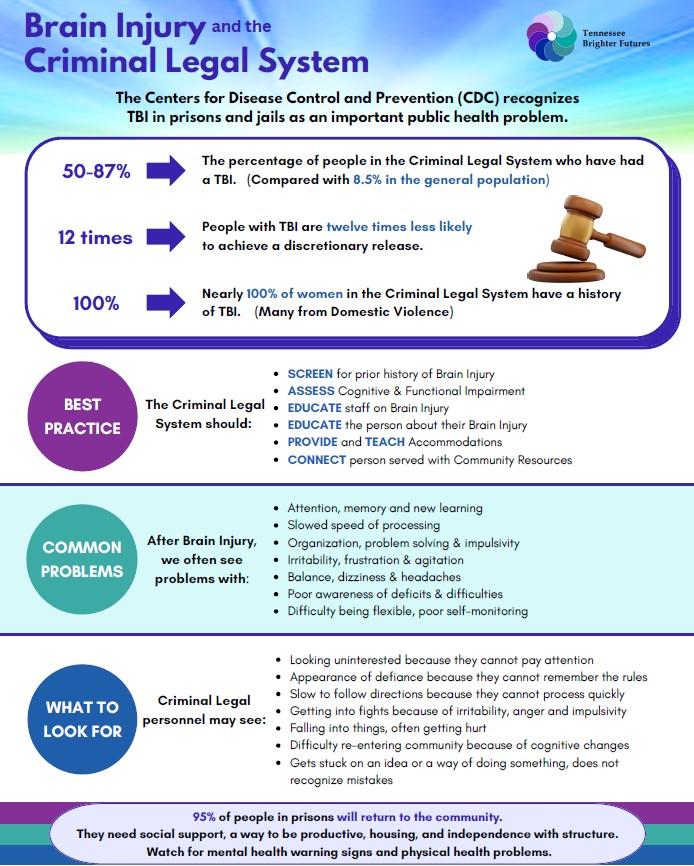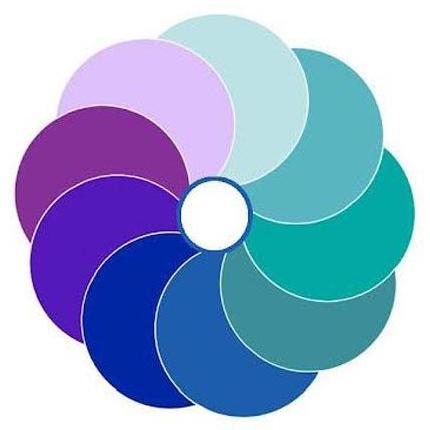
INFOGRAPHIC:
Brain Injury & the Criminal Legal System
English PDF and Alt Text
Spanish PDF and Alt Text
ABOUT CRIMINAL JUSTICE
Criminal justice is an umbrella term that refers to the laws, procedures, institutions, and policies at play before, during, and after the commission of a crime. https://www.law.cornell.edu
Tennessee's criminal justice system includes:
- a range of city and county law enforcement agencies,
- a prosecution arm,
- a public defense system,
- the state judiciary, local and state corrections, and
- a range of for-profit and non-profit service providers. https://www.tn.gov
Criminal Justice numbers in Tennessee:
- Tennessee currently has approximately 30,000 people incarcerated in jail and approximately 20,000 people incarcerated in prison.
- Out of these, approximately 95% will be released.
- 1 in 3 Tennesseans has a criminal background.
- 1 in 2 Tennesseans has a family member that has been incarcerated. https://www.tn.gov/workforce/reentrytn/about.html
- Tennessee Department of Corrections (TDOC) supervises 79,000 offenders on probation, parole or community corrections.
https://www.tn.gov/correction/about-us/department-overview.html
Like other corrections departments nationwide, Tennessee's most pressing challenge today is population growth. The agency has developed strategies that have been shown to reduce populations including the expansion of regional drug court programs, residential and community-based treatment and diversion programs, sentencing reforms, and contracting with counties for bed space. To address the issue of escalating health care costs, the Office of Clinical Services has secured contractual agreements for medical as well as mental health and substance use treatment.
https://www.tn.gov/correction/about-us/department-overview.html
TDOC Reentry Services helps to address the challenges face in the transition from incarceration to community. Their services include:
- Personal Document Assistance
- Employment Assistance
- Housing Support
- Education and Skill Building
- Community Support
- Veteran’s Benefits
INTERSECTIONALITY WITH BRAIN INJURY
The issue of Traumatic Brain Injury in prisons and jails is big enough that the CDC recognizes it as an important public health problem. Within five years after an injury, nearly one-third report some involvement with the criminal justice system. In the adult criminal justice system 50-80% have had a Traumatic Brain Injury (as compared with 8.5% in the general population. People with a TBI are 14 times more likely to incur a serious charge and 12 times less likely to achieve a discretionary release. Having a TBI increases the risk of recidivism by 69%. It is believed that close to 100% of women in the justice system have a history of TBI – much of these injuries are due to domestic violence.
People with TBI in the CJ System are likely to have auditory comprehension; verbal and written language; reading; social communication; mental health (depression and anxiety) and/or behavior challenges (including anger control issues). These issues will cause problems with treatment and upon their release. Their lack of cooperation may be wrongly attributed to deliberate defiance.
Routine screening for a prior history of Brain Injury is recommended, as is cognitive testing for those identified with an injury. Transition services should involve accommodating for problems from the TBI. People with TBI in the Criminal Justice System also have higher rates of Substance Abuse and Mental Health issues. (TBI in the Youth Justice System, Ontario Neurotrauma Foundation & McMaster University. Traumatic Brain Injury in Prisons and Jails: An Unrecognized Problem; CDC.)
SCREENING TOOLS
For criminal justice, screening is for other co-occurring needs. See TBF website for related Resource pages.
NASHIA’s OBISSS (Online Brain Injury Screening and Support System)
CRISIS INTERVENTION TOOLS
988 Suicide & Crisis Lifeline or you can text to 988; 988lifeline.org to chat with someone
Veterans Crisis Line: Dial 988, then Press 1; or text 838255
NAMI Blog: How to Help Someone in Crisis
211 Helpline | Get Connected. Get Help. (unitedwaygreaternashville.org): The 211 Helpline is a 24/7 365-day information and referral help line that provides individuals in need with help in times of crisis and beyond.
SAMHSA National Helpline: Confidential free help, from public health agencies, to find substance use treatment and information. 1-800-662-4357
User Guides for Lifeline Phones | AssuranceWireless
Crisis Intervention after Brain Injury: https://www.bianc.net/crisis-intervention-after-brain-injury/
WEBSITES
- Social Security Number and Card
- Vital Records
- TennCare
- Restoration of Voting Rights
- Family Services
- Driver License Services
- Criminal Justice Services
TN Department of Labor and Workforce Development, Office of Reentry Employer Guide for Employing Justice-Involved Tennesseans, free services for job seekers and more. Spanish available.
Treatment Court Toolkit for Individuals with ABI (Acquired Brain Injury)
TN Reentry Collaborative TREC is a joint effort that brings together state, local, and non-profit agencies, all working to address the reentry needs of individuals. By fostering partnerships and collective efforts, this initiative provides solutions that promote successful reintegration and reduce recidivism rates.
TN Association of Recovery Court Professionals
Toolkit: A Treatment Court Toolkit for Supporting Individuals with Acquired Brain Injury
NASHIA Criminal & Juvenile Justice Best Practice Guide for State Brain Injury Programs
TRAININGS
TN Association of Recovery Court Professionals (TARCP) trainings and conference
TARCP: A Recovery Court Podcast
Tennessee Office of Reentry “Talking Second Chances” Podcast
NASHIA Criminal & Juvenile Justice Workgroup 2020 SOS Workgroup: CJJ Presentation
TN BRIGHTER FUTURES GROUPS THAT ARE a PART OF THIS SYSTEM of CARE
TN Department of Corrections
TN Association of Recovery Court Professionals
TN Public Defender’s Office
Administrative Office of the Courts
Rutherford County Recovery Court
TN Office of Re-entry, Department of Labor and Workforce Development
Contributors
William Arnold Ed.D, TN Office of Re-entry, Dept. of Labor and Workforce Development
Victoria Ricci, TN Department Of Corrections, Director of Reentry Services
Lindsey Davis, Rutherford County Recovery Court, Re-entry Program Coordinator
LaChelle Ricks, Rutherford County Recovery Court, Re-entry Program Director
Janet Hobson, TN Association of Recovery Court Professionals Board
Meeting/Training PowerPoint PDF_Arnold
Meeting/Training PowerPoint PDF_Davis
Meeting/Training PowerPoint PDF_BI Intersectionality_Brain Links





